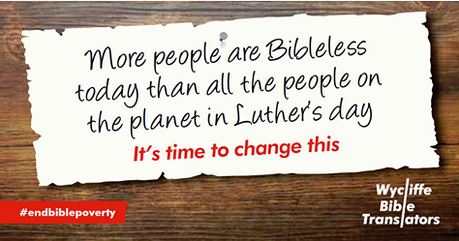Luther’s translation of the Bible into German spurred on Bible translation in Europe, especially in French, Dutch and English.
Following my post yesterday, I want to flag up what Wycliffe Bible Translators UK and Ireland have blogged about Luther and his impact on Bible translation.

Martin Luther (b. November 10, 1483 – d. February 18, 1546), is most famous for nailing his 95 Theses to the church door at Wittenberg – 500 years ago this year – which many people cite as the primary starting point of the Reformation.
Yet Luther’s later work translating the Bible was also fundamental to the Reformation.
Luther loved the Bible but knew that, at the time, the Bible was not accessible to everyone. So he concluded that a new translation, in the common language of the German people was necessary.
His focus as he worked on the translation was to enable the ‘tailors and shoemakers, yea, even women and ignorant persons’ to be able to read God’s word for themselves. Indeed, he was so committed to the ordinariness of the language in the translation, he would take trips into local towns and villages to listen to the way people spoke.
Luther’s translation marked a shift in the church’s approach to the Bible, as Philip Schaff notes:
“The Bible ceased to be a foreign book in a foreign tongue, and became far more clear and dear to the common people. Hereafter the Reformation depended no longer on the works of the Reformers, but on the book of God, which everybody could read for himself as his daily guide in spiritual life.”
It spurred on Bible translation in Europe, especially in French, Dutch and English.
The Bible translation work of people like Luther and Tyndale were crucial in enabling people in many countries to read the Bible in their own languages, not to mention the spread of education and literacy.
Yet now over 1.5 billion people – more than the entire world population when Luther was alive – still do not have the Bible in the language they speak and understand best. Wycliffe Bible Translators is working so that all peoples around the world can engage with the Bible in the language they most understand.
Wycliffe is using messages like the one below to point out the continuing need for Bible translation – click on the image to find out more about #endbiblepoverty today
Go to the Wycliffe UK Blog and read some great stories – and to the Wycliffe website to watch some videos – about the impact of Bible translation 500 years after Martin Luther nailed his 95 Theses to the Wittenberg church door.


Leave a comment